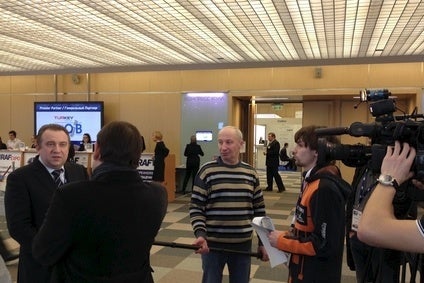
Russian politicians are backing the emergence of a greater emphasis on the commericial sector as one factor to address domestic automotive sales which fell 6% last year.
And despite current tensions between Moscow, Washington and western capitals surrounding the Ukraine and Crimea situation, the government views Russia as no longer separate from Europe and other regions as it looks to recover lost sales.

Discover B2B Marketing That Performs
Combine business intelligence and editorial excellence to reach engaged professionals across 36 leading media platforms.
The view of Russian resurgence was put forward strongly by the Deputy Minister of Industry and Trade of the Russian Federation, Alexey Rakhmanov, at this week’s Russian Automotive Forum in Moscow, organised by Adam Smith Conferences.
“We no longer separate ourselves from what is happening in Europe and other parts of the world,” said Rakhmanov. “We are very well connected.
“In 2013, we saw a rather strange situation in the market. Even though we had a 6% downturn, we were not able to identify one specific trend that affected the situation in cars and LCVs – some were growing others were dropping.
“The lion’s share of the downturn was in commercial, probably because we provided no government support in the segment. At the same time, production remained at the same level.
“Our goal is to have 80% of vehicles manufactured in Russia – we are getting there slowly. This means investment conditions we have provided to Russian and foreign companies have proved effective.”
Rakhmanov also highlighted the RUB8.8bn (US$238m) of potential loans available for car manufacturers in a four-year programme that was launched last April and which has seen 276,000 models sold using the scheme.
“We think sales on credit are an important signal to the market, but we should not overheat it so it becomes risky for car companies and bankers,” he said. “There is money available and we are missing the opportunity.
“We think the time has come where this project can be effective developing Russian vehicles using localised parts.”
Warming to his localising theme, the Minister noted there “serious goals ahead of us” with domestic production becoming a “top priority” for this year, particularly in the light of challenging exchange rates in Russia.
“It is very important for us, especially when you see what is happening with exchange rates,” said Rakhmanov. “It is very important local parts and materials are used as much as possible. Unfortunately, the situation is not very encouraging at the moment.”
The Trade Minister also predicted 2014 would not see growth in the Russian automotive sector – “somewhere between optimistic and pessimistic” was his assessment. “We don’t know what will be the final outcome – sales are cyclical,” he noted.
Rakhmanov also reiterated the gap in State support for commercial vehicles, but insisted the Russian government now had “an idea roughly how much money to allocate to stimulate commercial vehicles using LNG,” although he cautioned extra public transport provision required sufficient infrastructure to cope with it.
“There was only one big mistake we made – we allowed different provinces to buy buses as much as they had money,” said Rakhmanov.
“If you have 100 buses, you need to address infrastructure. If you do that, we think we can provide an emphasis for companies working in this area.”






